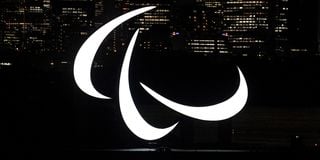Tokyo Paralympics to open as Japan battles virus surge

The Paralympics symbol is seen lit up at night on the Odaiba waterfront in Tokyo on August 23, 2021.
What you need to know:
- The opening ceremony will come with Tokyo and 12 other regions under a virus state of emergency that largely limits the opening hours of bars and restaurants and bans them from selling alcohol.
- Experts have warned that the measures do not seem to be working and tougher restrictions are needed, with some arguing that going ahead with the Games has undermined government messaging on the virus.
Tokyo
Tokyo's Paralympic Games open on Tuesday with athletes hoping to shatter stereotypes and world records despite a year-long pandemic delay and the spectre of a new wave of virus cases in Japan.
The ongoing health crisis will hang over every aspect of the Games, with Japan's Emperor Naruhito declaring the event open before a largely empty stadium as virus rules mean spectators are banned from almost all events.
Still, for over 4,400 athletes from 162 teams, the Games are a long-awaited moment, after the disappointment of the postponement and worries about a potential cancellation.
Among those competing are Germany's world record-setting long-jumper Markus Rehm, dubbed the 'Blade Jumper', and Japan's wheelchair tennis legend Shingo Kunieda.
China is expected to continue its long-running Paralympic gold medal dominance, but host Japan will be hoping its record 254-strong team can repeat the country's Olympic gold rush.
On Tuesday afternoon, crowds gathered in parts of Tokyo to watch the Blue Impulse air display team fly over trailing smoke in the blue, red and green colours of the Paralympic symbol.
The run-up to the Games has been fraught, with polling for months showing Japanese were opposed to hosting them this summer.
The mood seemed to shift once the Olympics got under way, with a majority saying they were glad it had gone ahead, but the virus situation in Japan has worsened dramatically in recent weeks.
The country has recorded more than 25,000 daily infections in the past week, and while the death toll remains comparatively small at around 15,500, just 40 percent of the population is fully vaccinated.
'Remain vigilant'
The opening ceremony will come with Tokyo and 12 other regions under a virus state of emergency that largely limits the opening hours of bars and restaurants and bans them from selling alcohol.
Experts have warned that the measures do not seem to be working and tougher restrictions are needed, with some arguing that going ahead with the Games has undermined government messaging on the virus.
Paralympic athletes will be subject to the same rules as their Olympic counterparts, including daily testing, mandatory mask-wearing and limits on their movement.
Almost all spectators will be barred from venues, though a school programme bringing children to some events is going ahead.
International Paralympic Committee chief Andrew Parsons said Monday that banning spectators was "the right decision."
"My message is turn on the TV and enjoy as much Paralympic Games as you can."
He has insisted the Games will be held safely, but added that participants "must remain vigilant... We must not be complacent."
In a sign of the ongoing concerns, New Zealand's Paralympic team will not participate in the opening ceremony, though organisers said it was the only team opting out.
Olympic organisers have reported 547 cases linked to the Games, mostly among Japan-based employees or contractors, and even before the Paralympic opening ceremony, 151 cases have been detected among participants.
'We need to bring change'
Japan team deputy chief Miki Matheson told AFP that challenging conditions were nothing Paralympians hadn't experienced before.
"For Paralympians, facing adverse challenges and pursuing what is possible for them is nothing special," she said.
"Although conditions are tough in the pandemic, it means a lot for them to see what they can do and shine."
This year's Paralympics will feature 22 sports, with badminton and taekwondo appearing for the first time.
Among the athletes to watch will be long-jumper Rehm, who is planning to "attack" the 8.62 metre world record he set in June.
Rehm, 33, has admitted he had struggled after the Games were postponed, wondering if he could maintain his form.
"My coach made it happen," he told reporters.
"My coach did everything to prepare me for this day, and I'm definitely going to try to attack this 8.62," he said.
The Games will also put the spotlight on Japan's record of disability inclusion, with activists saying more remains to be done despite some progress, especially in Tokyo, on accessibility.
"Tokyo is hosting the Paralympic Games for the second time, so this time round we need to bring change to society," Tokyo 2020 chief Seiko Hashimoto said Monday.
"If we can achieve that, we can consider the Paralympics a success."




